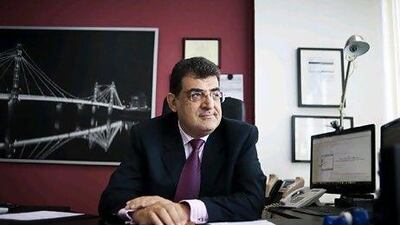Themos Papalas is the owner of The Holidays Shop - a short-term rental agency offering luxury serviced apartments and villas in Dubai. The Greek, who relocated to the Emirates in 1997 to work in shipping, moved into tourism after witnessing the industry's boom in the mid-2000s.
Describe your financial journey so far.
My father was a captain in the merchant navy and from the age of 12, I joined him on his ships during the holidays, giving me the chance to visit a lot of countries. I studied business administration at university in Greece before completing a master's in the US. I then worked in Greece and Saudi Arabia in the shipping sector before moving to the UAE in 1997. Working for a shipping agency, I was the representative of the vessel's crew when they arrived in port, sorting out everything from cash transfers to crew changes and booking accommodation. So there are some similarities between my former career and the business I am in now.
Why did you decide to set up your own business?
With Dubai's growth and the boom in the tourism industry, I saw a chance to establish my own company. At the time, there were limited hotel rooms and people were looking for an alternative solution. So my wife, Sofia, and I thought we would offer serviced apartments with five-star facilities. This is very common in Europe, where people like to have more space, more privacy and pay less than they would in a hotel. The property's owner takes 75 per cent of the gross income and we keep 25 per cent to cover our services.
How do you maintain quality?
My wife is an interior decorator and inspects the apartments and villas herself. If a property does not fulfil her standards, we propose an upgrade, which we can do on their behalf, such as painting, adding more decoration or facilities such as a safe box, a shoeshine kit or a microwave. Our main concern is that the quality of the apartment is always the same because it's like a hotel and has to come fully equipped with all the amenities, from cutlery and crockery in the kitchen to bath slippers and bathrobes.
Have you experienced any financial difficulties?
My business was going perfectly until 2008, when the market changed dramatically due to the crisis. Because we are the managers and not the owners of the properties, many owners decided to sell or self-occupy. We went from managing 40 properties to 14, so we had a 70 per cent drop in business. At the same time, I was exposed to higher expenses because I'd invested in some apartments and needed to meet the repayment obligations. I didn't want to lose any money, so I minimised all unnecessary expenses and reorganised my company. I also negotiated a better repayment schedule with the developers.
What has been your most valuable financial lesson?
Tourism has recovered from the crisis here partly because of the uprisings in places like Egypt and Syria, which has driven tourists here. I manage 40 properties once again and my occupancy rates are higher than ever. The only problem is that the prices are still lower than in 2007. The same apartment that cost Dh10,000 a week now goes for Dh6,000 a week. What this has taught me is that all companies, big or small, are exposed to the same risks. Some of the world's major corporations were bankrupted, yet the smaller companies survived because they were more flexible. You need proper management no matter the size of the company.
What do you like to invest in?
Mainly in property. I have invested in Dubai and Greece, but I don't want to expand our investments in Greece because there is high taxation and the returns are generally not good. It's very sad to see my family and my country suffer because of the crisis. Our reputation has been affected and people no longer trust Greece, which is not good for me. I do want to return, mainly when I retire, but I'd like to spend half the year there and the other half here. For me, the UAE is a second country; I've lived here for 15 years. I feel comfortable, the people respect expatriates, criminality is very low compared to Greece and it's a good place to live provided you have a good income because Dubai has become very expensive.
How have you gained from the financial crisis?
I bought my first property in Dubai, a three-bedroom villa in the Springs development, in 2003 for Dh760,000. I sold it for Dh2 million in 2009 and bought a new villa that was triple the size in Green Community West for Dh2.5m that would have gone for Dh6m before the crisis. So I've had the chance to live in a very nice villa. I have bought others that are still at a loss - one in Dubai Marina, which is Dh200,000 down, though I should recover that when it is delivered this month, and a one bedroom in Jumeirah Village, which is renting well and giving me a 10 per cent return.


